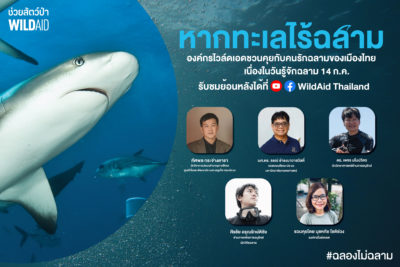
Bangkok, Thailand – In honor of Shark Awareness Day, WildAid held a webinar on the topic of “Oceans without Sharks” with experts across Thailand to discuss issues surrounding shark conservation. Experts also discussed the need for stronger regulations, such as the expansion of marine protected areas, restricting the use of certain fishing gears, and engaging local fishermen in shark conservation.
Tassapon Krajangdara, Senior Fisheries Biologist, Phuket Marine Fisheries Research and Development Center, Department of Fisheries gave an overview of the shark situation in Thailand. He stated that Thailand has no targeted shark fisheries and no specific gear for catching sharks. Sharks are usually caught as bycatch and only make up less than 0.5% of the total catch. Trawls, such as otter board and paired trawls, are most often the equipment catching the sharks in question. Krajandara also stated that all parts of sharks are utilized, not just the fins. However, data from the annual fisheries statistics of Thailand from 1998-2019 demonstrates a gradual decline of shark landing in the past 14 years, particularly since 2015, which indicates overfishing.
“The current state of the Thai ocean could soon lead it to the state of “empty ocean”, where a population of marine animals that play a role in balancing the ocean’s ecosystem begin to rapidly decline to signal the severity of overfishing,” added Dr. Petch Manopawitr, Conservation Scientist. When asked about the consequences of oceans without sharks, Dr. Petch shared that there are case studies from several countries that show that the absence of an apex predator like sharks leads to a trophic cascade.
Associate Professor Dr. Thon Thamrongnawasawat, Deputy Dean of Faculty of Fisheries at Kasetsart University mentioned that three steps can be taken for better protection of sharks in Thailand. First is raising awareness of the importance of sharks among the general public and fishermen, along with reducing demand for consumption of sharks. The second is listing sharks in Thai waters that are vulnerable to extinction as a protected species. Currently, whale shark is the only shark species listed as a protected species in Thailand. Hammerhead shark is in process of being listed as a protected species, while leopard shark should be urgently listed due to its declining population. The last suggestion is the expansion of marine protected areas which will help in not only the protection of sharks but other marine species as well. However, Dr. Thon explained that there needs to be restriction of particular types of fishing gears in areas that are crucial for restoring shark populations, which will require the government’s efforts to monitor and enforce the law. He also mentioned that Thailand has adopted the target of 10% of coastal and marine areas to be protected by the year 2030.
Dr. Petch agreed that the solution to reduce the number of sharks caught as bycatch is to expand marine protected areas, especially areas that are important for shark and ray conservation. We can refer to endemic sharks such as the leopard shark to identify areas that need to be protected and consider including known breeding grounds of sharks as marine protected areas. Additionally, there needs to be a prohibition of trawl fishing equipment in areas where sharks are most often caught as bycatch. These recommendations will allow for conservation and sustainable use of marine resources to effectively coexist.
During the webinar ‘Shin’ Sirachai Arunrugstichai, a conservation photographer and shark researcher, spoke about some of the research gaps surrounding sharks in Thailand that challenge shark conservation efforts. He shared that there is a huge gap in knowledge and research of sharks in Thailand, specifically on new species that are being seen more frequently. Arunrugstichai revealed that the collection of data on sharks also has its challenges. Today, it is no longer possible to collect data from shark landing sites due to the decline in shark landings). To collect this data, one needs to rely on a large sample size (i.e. a large number of sharks landing at a fishing pier) which doesn’t occur as frequently as it once did. We need to rely on fishermen and the fishing industry to collect data and help us identify areas that need protection, as they have the experience and knowledge to guide this endeavor. “Building a good relationship with fishermen can help us learn more about sharks to protect them better,” added Arunrugstichai.
According to WildAid’s 2017 Shark Fin Demand in Thailand survey findings, more than half of urban Thais have eaten shark fin, while alarmingly 61% of all respondents plan to consume it again in the future. Survey respondents said they consumed shark fin most often at weddings (72%), family meals at restaurants (61%), and business meetings (47%). WildAid launched the “Celebrate with No Shark Fin” campaign with the aim to end shark fin consumption in Thailand and thereby protect sharks, fisheries and the ocean ecosystem.
The webinar held on July 13th is a part of WildAid’s campaign to raise awareness on the importance of sharks, reduce demand for shark fin, and call for better protection of sharks in Thailand. The webinar was live-streamed through Facebook reaching over 1000 people and engaging over 400 people with views, likes, shares and comments.
Stay in touch and get the latest WildAid updates.
SIGN UP